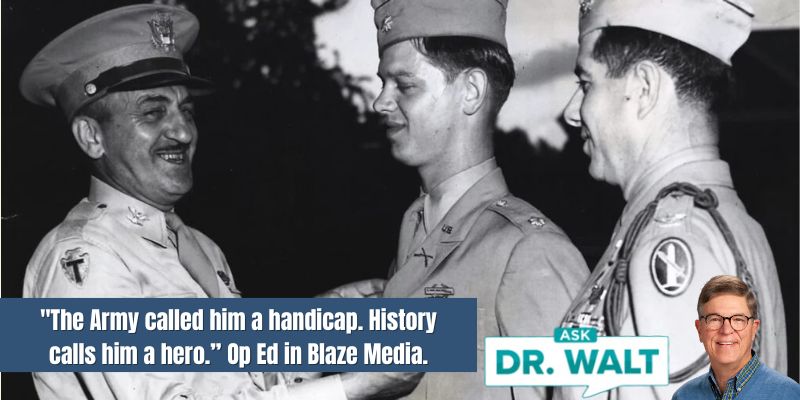
“Ask Dr. Walt” in Today’s Christian Living “Should you use red yeast rice?” (Part 6 of 7)
April 8, 2024
“Ask Dr. Walt” in Today’s Christian Living “Why choose a statin instead?” (Part 7 of 7)
April 9, 2024War correspondent Ernie Pyle wrote, “One day I was driving on a muddy lane alongside a woods, with an officer friend of mine who has been wounded twice and who has been at war a long time. On both sides of the lane were soldiers walking, returning to the rear. It was the typical movement of troops being relieved alter a siege in the front line.”[1]

He continued in an article titled, “Troops Back From Line Have That ‘Look’ In Their Eyes:”[1]
Their clothes were muddy, and they were heavily laden. They looked rough, and any parade ground officer would have been shocked by their appearance. And yet I said:
“I’ll bet those troops haven’t been in the line three days.”
My friend thought a minute, looked more closely as they passed, and then said:
“I’ll bet they, haven’t been in the line at all. I’ll bet they’ve just been up in reserve and weren’t used, and now they’re being pulled back for. a while.”
How can you tell things like that? Well, I made my deduction on the fact that their beards weren’t very long, and although they were tired and dirty, they didn’t look tired and dirty enough.
My friend based his on that, too, but more so on the look in their eyes.
“They don’t have that stare,” he said.
A soldier who has been a long time in the line does have a “look” in his eyes that any one with practice can discern.
It’s a look of dullness, eyes that look without seeing, eyes that see without transferring any response to the mind. It’s a look that is the display room for the thoughts that lie behind it—exhaustion, lack of sleep, tension for too long, weariness that is too great, fear beyond fear, misery to the point of numbness, a look of surpassing indifference to anything anybody can do to you. It’s a look I dread to see on men.
And yet it’s one of the perpetual astonishments of a war life to me, that humans recover as quickly as they do. You can take a unit that is pretty well exhausted, and if they are lucky enough to be blessed with some sunshine and warmth, they’ll begin to be normal after two days out of the line. The human spirit is just like a cork.
When companies like this are pulled out for a rest, they spend the first day getting dug into their new position, for safety against occasional shellings or bombings.
Usually they’ve slept little during their time in the line, so on their first night they’re asleep early and boy, how they sleep.
Next day they get themselves cleaned up as best they can. They shave, and wash, and get on some fresh clothes if their barracks bags have been brought up. They get mail and they write letters, and they just loaf around most of the day.
On both the second and third days, they take on replacements and begin getting acquainted with them. All over the bushy slope where they’re bivouacked, you sec little groups of men squatting in tight circles. These are machine-gun classes. The classes are for the new men, to make sure they haven’t forgotten what they learned in training, and to get them accustomed to the great necessity of knowing their guns and depending on them.
Replacements arrive in many different stages of warfare. The best method is for replacements to come when a whole regiment is out of the line for a long rest. Then the new men can get acquainted with the older ones, they can form their natural friendships, and go into their first battle with a feeling of comradeship.
Others arrive during these very short rest periods, and have only a day or so to fit themselves into the unit before going on into the great adventure.
The worst of all is when men have to join an outfit while it’s right in the line. That has happened here on the Fifth Army beachhead.
There have been cases here where a company had to have replacements immediately. It was in circumstances where no front-line movement whatever in daytime was possible. Hence the new men would have to be guided up at night, establish themselves in their foxholes in darkness, and inhabit that foxhole until it was all over.
I feel sorry for men who have to do that. All of us who have had any association at all with the possibility of death know that the main thing you want is not to be alone. You want company, and preferably somebody you know.
It must be an awful thing to go up to the brink of possible death in the nighttime in a far-away land, puzzled and afraid, knowing no one and facing the worst moment of your life totally alone.
That takes strength.
~~~~~
[1] Ernie Pyle. With Fifth Army Beachhead Forces in Italy. (By Wireless). The Commercial Appeal, Memphis. News Clipping in small brown scrapbook with heavily embossed front.
In case you haven’t read or listened to Dad’s book, you can learn more or order it here.
© Copyright WLL, INC. 2024.




